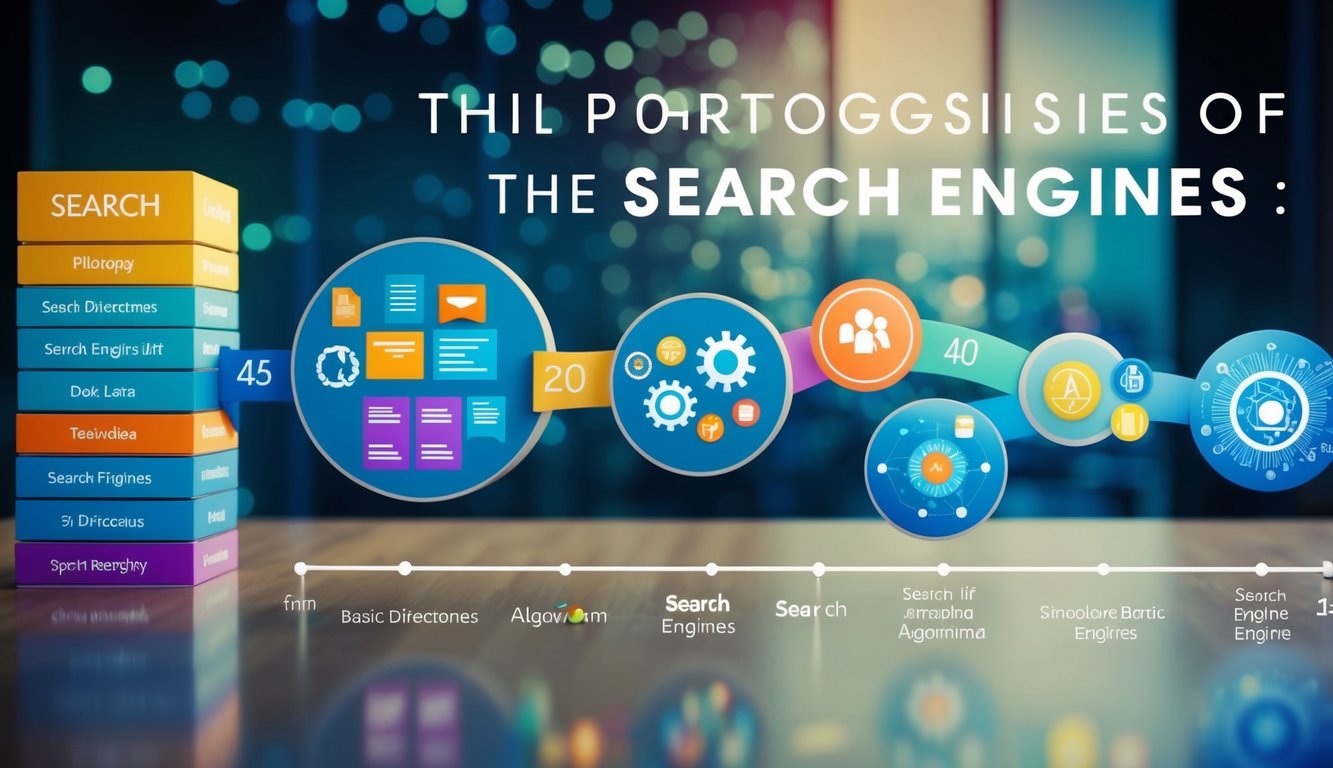The Evolution of Search Engines
Remember when you used to flip through bulky phone directories to find a business? Well, the internet started out pretty much the same way.
Early search engines were simple directories, categorized lists of websites that you’d browse through like a digital Yellow Pages.
Not exactly efficient, right?

Fast forward to today, and you’re using search engines that can practically read your mind.
Modern search engines employ complex algorithms powered by artificial intelligence and machine learning, understanding the nuances of human language and interpreting your search intent.
It’s like having a genius librarian at your fingertips, one that not only knows every book in existence but can also guess which one you’re looking for before you even finish your sentence.
This evolution hasn’t just changed how you find information; it’s transformed the entire digital landscape.
From shaping digital marketing strategies to influencing how websites are built, search engines have become the gatekeepers of the online world.
And trust me, you’re going to want to know how we got here.
Key Takeaways
- Search engines evolved from simple directories to AI-powered platforms that understand user intent
- This evolution has dramatically improved user experience in finding relevant information online
- The development of search engines has profoundly influenced digital marketing and website design strategies
The Birth of Web Directories
The internet’s early days were a chaotic mess of information. You couldn’t just Google what you needed – that wasn’t even a verb yet!
Web directories emerged as the first attempt to bring order to the digital wilderness.
Early Search Technologies
Remember when finding stuff online felt like searching for a needle in a haystack? That’s where web directories came in.
Archie, developed in 1990, was one of the first tools to help you navigate the web.
It wasn’t fancy, but it got the job done.
These early directories were basically giant lists of websites, organized by category.
You’d click through folders like “Sports” or “Technology” to find what you needed.
No fancy algorithms, just good old-fashioned human curation.
Think of it as the library card catalog of the internet.
Sure, it was clunky, but it beat randomly typing in web addresses and hoping for the best.
Notable Early Search Engines
You might not recognize these names, but they paved the way for the search giants of today:
- Excite: Launched in 1993, it combined directory services with keyword search. Pretty cutting-edge for its time!
- Yahoo!: Started as “Jerry and David’s Guide to the World Wide Web” in 1994. It became the go-to directory for millions.
- Lycos: Also founded in 1994, it added some serious firepower to the search game.
These pioneers showed that people were hungry for better ways to find information online. They weren’t perfect, but they set the stage for the search revolution to come.
The Rise of Algorithm-Based Search Engines
Algorithm-based search engines revolutionized how you find information online.
Gone were the days of manually curated directories – complex mathematical formulas now determined what you saw in search results.
The Introduction of PageRank
Google’s PageRank algorithm changed the game in 1998.
Developed by Larry Page and Sergey Brin at Stanford, it analyzed the web as a network of links.
PageRank assigned importance to pages based on the quantity and quality of links pointing to them.
The more authoritative sites linking to a page, the higher it ranked.
This approach proved far more effective than simple keyword matching.
It allowed Google to return more relevant results, even for ambiguous queries.
The Role of Backlinks in Early Algorithms
Backlinks became the currency of the web.
Search engines viewed them as “votes” for a site’s credibility and relevance.
You could no longer just stuff keywords into your pages and expect to rank.
The focus shifted to creating quality content that others would want to link to.
This sparked the birth of link building as an SEO tactic.
Savvy webmasters sought backlinks from reputable sites to boost their rankings.
Transition from Directories to Algorithmic Search
The late 1990s saw a rapid shift from human-curated directories to crawler-based search engines.
AltaVista led the charge, using algorithms to index millions of web pages automatically.
You no longer had to manually submit your site to be included. Search engines would find and index your content on their own.
This allowed for much larger, more comprehensive search indexes.
It also meant results could be updated more frequently, keeping pace with the rapidly growing web.
Key Milestones in Search Engine Development

Search engines have come a long way since their inception. You’re about to discover the game-changing moments that shaped the digital landscape we navigate today.
The Launch of Google
In 1998, you witnessed a seismic shift in the search engine world.
Google burst onto the scene, armed with its revolutionary PageRank algorithm.
This wasn’t just another search engine; it was a paradigm shift.
PageRank changed the rules of the game. It ranked web pages based on their importance and relevance, determined by the number and quality of links pointing to them.
Suddenly, you weren’t just searching; you were finding exactly what you needed.
Google’s clean interface and lightning-fast results quickly won over users. Within a few years, you probably found yourself “Googling” instead of “searching.”
The company’s rapid growth and innovative approach set new standards for the industry.
The Advent of Mobile Search
Fast forward to the late 2000s, and you’re holding the internet in your pocket.
The rise of smartphones revolutionized how you access information. Search engines had to adapt, and adapt they did.
Mobile search brought new challenges and opportunities.
You needed results tailored to your location, device, and on-the-go lifestyle.
Search engines responded with:
- Mobile-friendly algorithms
- Local search capabilities
- Voice search integration
Suddenly, finding a nearby coffee shop or checking movie times became a breeze.
You could get answers without even typing, just by speaking to your device. The world of information was literally at your fingertips.
Voice Search and AI Integration
Welcome to the era of conversational search.
You’re no longer typing queries; you’re asking questions.
Voice assistants like Siri, Alexa, and Google Assistant have become your digital concierges.
AI and machine learning are the secret sauce behind this evolution.
These technologies help search engines understand context, intent, and natural language.
You can ask complex questions and get surprisingly accurate answers.
The integration of AI has also improved personalization.
Search engines now consider your search history, preferences, and behavior to deliver tailored results.
It’s like having a personal researcher who knows exactly what you’re looking for.
As voice search continues to grow, you’re seeing a shift towards more conversational content.
Websites are adapting to answer your questions directly, making information even more accessible.
Impact on User Experience

Search engines have revolutionized how you interact with information online. They’ve transformed from basic directories to sophisticated platforms that anticipate your needs and deliver personalized results.
Enhanced Search Relevance
Remember when you had to sift through pages of irrelevant results? Those days are long gone.
Modern search engines use complex algorithms to understand the context of your queries. They analyze factors like your location, search history, and even the time of day to serve up the most relevant results.
You’ll notice that search engines now prioritize user experience, ensuring you find what you’re looking for faster than ever.
Gone are the days of exact keyword matching. Now, these digital wizards understand synonyms, intent, and even the nuances of natural language.
Want to find a great pizza place nearby? Just type “pizza” and watch as your search engine presents a list of top-rated local pizzerias, complete with reviews, menus, and directions.
Personalization and User Intent
You’re unique, and search engines know it.
They’ve become experts at tailoring results to your individual preferences and behavior.
Ever noticed how your search results differ from your friend’s, even when you use the same query?
Search engines like Google and Bing have mastered the art of personalization.
They consider your past searches, clicked links, and even your device type to customize your results.
But it doesn’t stop there.
These clever algorithms can now decipher your intent behind a search query.
Looking for “apple”? Based on your previous searches, they’ll know if you’re after fruit or the latest iPhone.
The Role of User Data in Search
You might not realize it, but every search you make contributes to a vast pool of data.
This information is the lifeblood of modern search engines, powering their ability to deliver increasingly accurate and personalized results.
Your search history, clicking patterns, and time spent on specific pages all feed into the algorithm.
This data helps search engines understand user behavior on a grand scale, allowing them to refine their algorithms continually.
But don’t worry, it’s not all Big Brother.
This data use translates into a better experience for you.
It means faster load times, more relevant suggestions, and even predictive search features that can finish your queries before you do.
Influence on Digital Marketing Strategies

Search engines have revolutionized how businesses approach digital marketing. Their evolution has sparked new strategies and techniques that marketers must master to stay competitive in the online landscape.
SEO Evolution and Best Practices
Gone are the days when stuffing keywords into your content was enough to rank. Today, search engine optimization (SEO) is a complex beast that demands a multifaceted approach.
You need to focus on user intent, not just keywords. Think about what your audience is really looking for when they type a query.
Are they seeking information, looking to make a purchase, or trying to find a specific location? Tailor your content to meet these needs.
Technical aspects like site speed and mobile-friendliness are now crucial. If your site loads slowly or looks terrible on a smartphone, you’re already losing the SEO game.
Don’t forget about backlinks. Quality over quantity is the name of the game here. One link from a reputable site in your industry is worth more than a hundred from random blogs.
The Shift to Content-Driven Marketing
Content is king, and search engines are its loyal subjects. Your digital marketing strategy must revolve around creating valuable, informative content that addresses your audience’s needs.
Blog posts, videos, infographics – mix it up. Search engines love diverse content types. But remember, it’s not just about pleasing algorithms. Your content needs to engage real people too.
Think about creating comprehensive guides or in-depth articles that cover topics exhaustively. These tend to perform well in search results and position you as an authority in your field.
Don’t shy away from long-form content. While attention spans might be shrinking, search engines (and readers) still appreciate thorough, well-researched pieces.
The Importance of Technical SEO
You might have the best content in the world, but if search engines can’t crawl and index your site properly, you’re invisible. Technical SEO is the unsung hero of digital marketing strategies.
Start with a solid site structure. Use clear, logical URL structures and implement proper internal linking. This helps search engines understand the hierarchy and relationship between your pages.
XML sitemaps are your friend. They act as a roadmap for search engines, ensuring all your important pages get discovered and indexed.
Pay attention to meta tags, especially title tags and meta descriptions. They’re your first impression in search results. Make them count.
Don’t neglect schema markup. This structured data helps search engines understand the context of your content, potentially leading to rich snippets in search results.
Broader Impact on the Internet Landscape
Democratization of Information
You’ve probably noticed how easy it is to find answers to just about anything these days. That’s no accident. Search engines have revolutionized information access on a global scale.
Gone are the days when knowledge was locked away in dusty libraries or the minds of experts. Now, with a few keystrokes, you can uncover facts on obscure topics or learn a new skill.
This democratization has leveled the playing field, giving everyone with internet access the power to educate themselves.
But it’s not all sunshine and rainbows. The ease of information spread has also led to challenges like misinformation and information overload. You’ve got to keep your wits about you and develop solid fact-checking skills.
Changes in Online Behavior
Remember when you used to browse aimlessly through web directories? Those days are long gone. Search engines have dramatically altered how you navigate the internet.
Your online journey now typically starts with a search query. This shift has spawned entire industries focused on search engine optimization (SEO) and digital marketing.
Businesses scramble to appear at the top of your search results, knowing that’s where your eyes land first.
You’ve also become more impatient. If a website doesn’t load quickly or provide the information you’re after, you’re likely to bounce back to the search results. This behavior has forced websites to up their game in terms of speed and content quality.
Future Trends in Search Technology
Buckle up, because the search engine rollercoaster isn’t slowing down anytime soon. AI-driven platforms are set to take your search experience to new heights.
Voice search is becoming increasingly prevalent. Soon, you might find yourself having full-blown conversations with your search engine.
“Hey Google, what’s the best recipe for chocolate chip cookies that won’t make me feel guilty?”
Predictive search is another trend to watch. Search engines will get eerily good at anticipating your needs before you even type them out.
It’s like having a digital mind reader at your fingertips.
Conclusion

Search engines have come a long way, haven’t they? From simple directories to complex algorithms, they’ve transformed how you find information online.
Remember those early days of manually curated lists? Now you’re dealing with AI-powered systems that can understand context and semantics. Pretty impressive, right?
Your SEO game has had to evolve too. Gone are the days of keyword stuffing and link farms. Now it’s all about high-quality content and user experience.
But don’t get too comfortable. The search landscape is always changing. What works today might be obsolete tomorrow.
So what’s next? AI-driven exploration is already here, and who knows what other innovations are on the horizon?
Your job? Stay informed, adapt quickly, and always focus on providing value to your users. After all, that’s what search engines are trying to do too.
Remember, in this ever-evolving world of search, the only constant is change. So buckle up and enjoy the ride. Who knows? You might just be part of the next big search revolution.